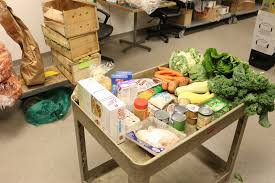A Lifeline for Food Pantries: The Role of Container Farming in Fighting Urban Hunger
A Lifeline for Food Pantries: The Role of Container Farming in Fighting Urban Hunger
Christopher Hebb
12/12/20245 min read


Understanding Container Farming
Container farming represents an innovative approach to agricultural production, especially in urban settings where space is limited. This method involves utilizing shipping containers or other modular units to create controlled agricultural environments. By employing advanced technologies, these farms can operate efficiently and sustainably, producing fresh food directly in the heart of cities.
At its core, container farming is designed to optimize space and resources. Each container is equipped with essential systems such as climate control, automated irrigation, and nutrient delivery systems. These components create ideal growing conditions for a variety of crops, allowing for year-round production irrespective of outdoor climate. The integration of hydroponics and aquaponics allows for soil-less growing, further enhancing efficiency by minimizing water usage. This results in a significant reduction in the overall water footprint of food production compared to traditional farming methods.
The technology that underpins container farming not only facilitates nutrient management but also promotes sustainable practices. Growers can monitor conditions within the units through innovative sensors and software, allowing for precise adjustments in real time. This level of control helps maximize yield while minimizing waste. Additionally, container farms can be strategically placed in urban areas, significantly reducing the distance food travels from producer to consumer, thus decreasing carbon emissions associated with transportation.
Moreover, container farming contributes to food security by enabling communities to produce their own food. This method proves particularly beneficial in food deserts, where access to fresh produce is limited. By generating fresh crops within the urban landscape, container farms not only offer food solutions but also create educational and employment opportunities for local residents, fostering a sense of community through agricultural engagement.
The Importance of Fresh Produce for Food Pantries
Access to fresh, nutrient-dense produce is essential for food pantries aiming to improve the health and well-being of underserved communities. Fresh fruits and vegetables are rich sources of vitamins, minerals, and dietary fiber, which play a crucial role in maintaining overall health. Providing these options not only helps address hunger but also fosters nutritional awareness among individuals and families who rely on food assistance. Research indicates that a diet high in fresh produce can reduce the risk of chronic diseases, including obesity, diabetes, and heart disease, prevalent in low-income populations. Therefore, food pantries that prioritize fresh produce contribute positively to public health.
However, food pantries face significant challenges with sourcing fresh fruits and vegetables. These challenges include spoilage due to limited shelf life, seasonal availability, and transportation issues. Fresh produce has a comparatively shorter period of usability when contrasted with processed foods, which can often remain edible for extended durations. Consequently, food pantries must engage in diligent planning and coordination with local farms, grocery stores, and food distributors to ensure a steady supply of fresh produce. Moreover, transportation plays a pivotal role; food pantries in urban areas may struggle to secure reliable means to transport perishable items from sources to distribution points. This flaw in the logistical chain can lead to food waste, which is especially detrimental given the high demand for nutritious food among marginalized populations.
Despite these obstacles, the benefits of integrating fresh produce in food pantry offerings are undeniable. Unlike processed food items that often contain high levels of sugars and preservatives, fresh fruits and vegetables provide wholesome nutrition. Empowering food pantries to minimize these challenges through innovative solutions, such as container farming, can significantly enhance their ability to offer fresh produce consistently. By ensuring access to nutritious foods, food pantries play a vital role in mitigating urban hunger and improving community health outcomes.
The Impact of Container Farms on Food Pantries
Container farming is increasingly being recognized as a transformative solution for food pantries, significantly enhancing their ability to provide fresh produce to communities facing food insecurity. This method involves growing food in repurposed shipping containers, equipped with advanced hydroponic and aeroponic systems. These farms can be established in urban areas where traditional agriculture may be impractical due to space and resource limitations, thus creating a sustainable supply chain for local food pantries.
Numerous case studies illustrate how container farms have partnered with food pantries to create a consistent stream of fresh fruits and vegetables. For instance, a notable collaboration in a metropolitan city involved a container farm directly supplying a local food pantry. This partnership not only ensured a reliable delivery of produce but also allowed the food pantry to diversify its offerings beyond shelf-stable items. Research indicates that access to fresh produce is linked to improved dietary habits, resulting in better health outcomes for clients. This benefits not only the individuals receiving assistance but also the broader community by fostering improved nutrition.
Moreover, container farms address the pressing issue of sustainability in urban agriculture. They require less water and land than traditional farming methods, promoting environmental conservation while also reducing waste through efficient growing practices. The use of renewable energy sources in these farms can further mitigate their carbon footprint, making them a viable long-term solution to urban hunger. As food pantries seek to enhance their services, integrating container farming can offer a path toward increased food security and resilience in food supply systems.
In sum, the collaboration between container farms and food pantries represents a progressive step in combating urban hunger, facilitating improved health and nutrition among communities that need it most.
Future Perspectives: Scaling Container Farming for Greater Impact
The potential for container farming to reshape urban food systems is significant, especially as the demand for sustainable, localized food sources continues to rise. As urban areas grapple with food insecurity, the scalability of container farming presents a promising solution. One of the key growth trajectories lies in advancements in technology that enhance food production methods. Innovations such as improved hydroponics and aquaponics systems, automated climate control, and energy-efficient LED lighting are crucial for maximizing yield and reducing operational costs.
Furthermore, the integration of data analytics and IoT devices allows urban farms to monitor and optimize growing conditions, thereby increasing efficiency. The utilization of these technologies not only boosts productivity but also ensures that container farms can adapt to varying urban challenges, such as climate fluctuations and resource availability. This adaptability makes container farming an attractive option for urban areas facing food supply disruptions.
Policy plays a critical role in the future of container farming. Supportive legislation and incentives can encourage the establishment of container farms in underserved communities. Local governments can facilitate zoning changes and provide grants or subsidies specifically designed for urban agricultural initiatives. Such policies may ultimately encourage private sector investment, further fueling the growth of container farming ventures.
Community engagement is another essential component for scaling these operations. By fostering partnerships between schools, nonprofits, and community organizations, container farms can create educational programs that promote awareness of food systems and nutrition. This community involvement not only helps in garnering support but also empowers residents to participate actively in local food production.
Collaborative efforts among local governments, businesses, and nonprofits are vital for leveraging container farming as a tool for urban hunger alleviation. By pooling resources and expertise, these stakeholders can create a robust network that supports sustainable food systems. In this context, container farming emerges as a sustainable, impactful approach to achieving food stability in urban settings, with the potential to feed communities and improve livelihoods simultaneously.
© 2025. All rights reserved.







